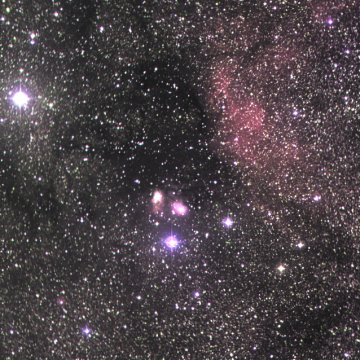Sh 2-88
Coordinates: (61.48°, 0.33°)
[ Catalog | Explorer | SIMBAD ]
This nebula associated with the Vul OB1 association consists of three regions - star formation began in a diffuse large nebula Sh 2-88A, then spread to the compact HII region Sh 2-88B1, ionised by an O8.5-9.5 V star, and then finally spread to the ultracompact Sh 2-88B2, ionised by a star dimmer than B0.5 V.
Avedisova lists three ionising stars: the O7 V star HD 338916, the O8.5 Ib supergiant HD 338926, and the B0.5 V star LS II +25 09.
You can see the Spitzer space telescope infrared view here.
Avedisova lists three ionising stars: the O7 V star HD 338916, the O8.5 Ib supergiant HD 338926, and the B0.5 V star LS II +25 09.
You can see the Spitzer space telescope infrared view here.
This nebula consists of three regions - star formation began in a diffuse large nebula Sh 2-88A, then spread to the compact HII region Sh 2-88B1, ionised by an O8.5-9.5 V star, and then finally spread to the ultracompact Sh 2-88B2, ionised by a star dimmer than B0.5 V.[1]
Notes
1. ^ Deharveng, L., Nadeau, D., Zavagno, A., et al. (2000). "The stellar content of the compact H II region Sh2-88B", Astronomy and Astrophysics, Vol. 360, 1107-1116. [2000A&A...360.1107D]
Distance estimates
2000 pc [1982ApJS...49..183B]1980 pc +/- 400 [1984NInfo..56...59A]
2400 pc [2000A&A...360.1107D]
Links
[ DSS | ADS | ADS Abstract ]
map | book | blog | gallery | sources

Most of the sources used to create these nebula descriptions are listed in the
notes section for each description. In some cases,
for example the Avedisova, Humphreys and Reed catalogs, the source is used extensively and is not listed in the
individual nebula descriptions. See this catalog overview
for more information on the catalogs and the general sources used
to create these descriptions and this introduction to HII regions
on the general history of this area of astronomy.
This image was created using the POSS-II/UKSTU data of the Digitized Sky Survey and SuperCOSMOS using the process described here.
According to my correspondence with the Royal Observatory Edinburgh and the Space Telescope Science Institute, I am allowed to use the POSS-II/UKSTU data to create and display images for non-commercial purposes so long as I include this fine print for the SuperCOSMOS data:
Use of these images is courtesy of the UK Schmidt Telescope (copyright in which is owned by the Particle Physics and Astronomy Research Council of the UK and the Anglo-Australian Telescope Board) and the Southern Sky Survey as created by the SuperCOSMOS measuring machine and are reproduced here with permission from the Royal Observatory Edinburgh.
and this acknowledgement taken from the DSS site:
The Digitized Sky Surveys were produced at the Space Telescope Science Institute under U.S. Government grant NAG W-2166. The images of these surveys are based on photographic data obtained using the Oschin Schmidt Telescope on Palomar Mountain and the UK Schmidt Telescope. The plates were processed into the present compressed digital form with the permission of these institutions.
The Second Palomar Observatory Sky Survey (POSS-II) was made by the California Institute of Technology with funds from the National Science Foundation, the National Geographic Society, the Sloan Foundation, the Samuel Oschin Foundation, and the Eastman Kodak Corporation.
The UK Schmidt Telescope was operated by the Royal Observatory Edinburgh, with funding from the UK Science and Engineering Research Council (later the UK Particle Physics and Astronomy Research Council), until 1988 June, and thereafter by the Anglo-Australian Observatory. The blue plates of the southern Sky Atlas and its Equatorial Extension (together known as the SERC-J), as well as the Equatorial Red (ER), and the Second Epoch [red] Survey (SES) were all taken with the UK Schmidt.
The "Second Epoch Survey" of the southern sky was made by the Anglo-Australian Observatory (AAO) with the UK Schmidt Telescope. Plates from this survey have been digitized and compressed by the ST ScI. The digitized images are copyright ? 1993-5 by the Anglo-Australian Observatory Board, and are distributed herein by agreement.
The "Equatorial Red Atlas" of the southern sky was made with the UK Schmidt Telescope. Plates from this survey have been digitized and compressed by the ST ScI. The digitized images are copyright ? 1992-5, jointly by the UK SERC/PPARC (Particle Physics and Astronomy Research Council, formerly Science and Engineering Research Council) and the Anglo-Australian Telescope Board, and are distributed herein by agreement.
The compressed files of the "Palomar Observatory - Space Telescope Science Institute Digital Sky Survey" of the northern sky, based on scans of the Second Palomar Sky Survey are copyright ? 1993-1995 by the California Institute of Technology and are distributed herein by agreement. The compressed files of the "Palomar Observatory - Space Telescope Science Institute Digital Sky Survey" of the northern sky, based on scans of the Second Palomar Sky Survey are copyright ? 1993-1995 by the California Institute of Technology and are distributed herein by agreement.